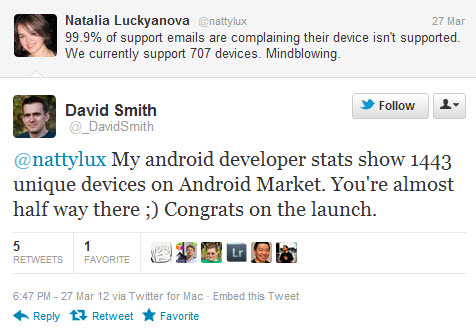The sorry state of Android hardware fragmentation

When we talk about Android fragmentation, as a rule we're talking about the shocking number of operating system versions that are in use at any one time, and how users are slow - not through their own fault - to adopt the latest and greatest release.
But there's a bigger problem facing Android, and one that has an even greater negative effect on developers than operating system fragmentation - device fragmentation.
How bad is the problem? Here's a conversation on Twitter between Natalia Luckyanova, co-founder of indie iPhone development company Imangi, and David Smith, an independent iPhone developer:
Speaking to The Next Web, Smith outlines the top six Android devices running his Audiobooks and Audiobooks Free apps based on 1.3 million downloads:
- Droid X (7.8 percent of users)
- Samsung Galaxy S2 (4.3 percent)
- Droid (4 percent)
- HTC Desire HD (4 percent)
- HTC Evo 4G (3.7 percent)
- Droid incredible (2.3 percent)
Remember, these are the top six devices out of a total of 1,443. Factor in the Android version that these devices are running, Smith says that half of the users are running Android 2.3.3 and then the rest are on versions ranging from 1.6 to 4.0.3. No developer can be expected to support hundreds of devices running a variety of aging platforms.
By comparison, with 8 to 10 different iOS devices, Smith says he can cover 100 percent of iOS users. To do the same with Android he would need thousands of test devices, and then test the software across all devices and platforms - an impossible task.
The Android fragmentation is seriously affecting developers. It's bumping up support costs and low reviews for the app from dissatisfied customers. Unhappy customers posting negative reviews because of hardware compatibility issues can be lethal for an app, even when the developer is not to blame for the problem.
Google may be seeing 850,000 new Android device activations per day but it seems that these are primarily devices running older releases of the Android platform. It's also likely that adoption of Android 4.0 is being slowed because handset makers, and carriers are painfully slow getting the update out to customers with handsets that can run it.
This, in turn, is harming Android developers. And these Android developers are the folks who build the ecosystem and give people a reason to embrace the platform.
Related:
- 'Ice Cream Sandwich' powers 1.6 percent of Android devices
- Android app ads account for up to 75 percent of battery drain
- Will Android tablets overtake the iPad by 2015?
- Why Apple doesn't need to innovate much to stay ahead of the competition
- New iPad is bad news for Android tablets
- iPad 3 will help Apple grab 70 percent of the tablet market in 2012
- 2011 - The year of the Android malware
